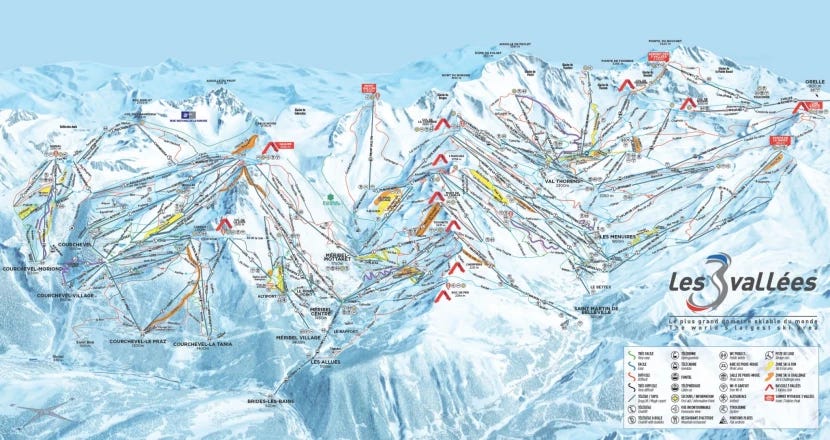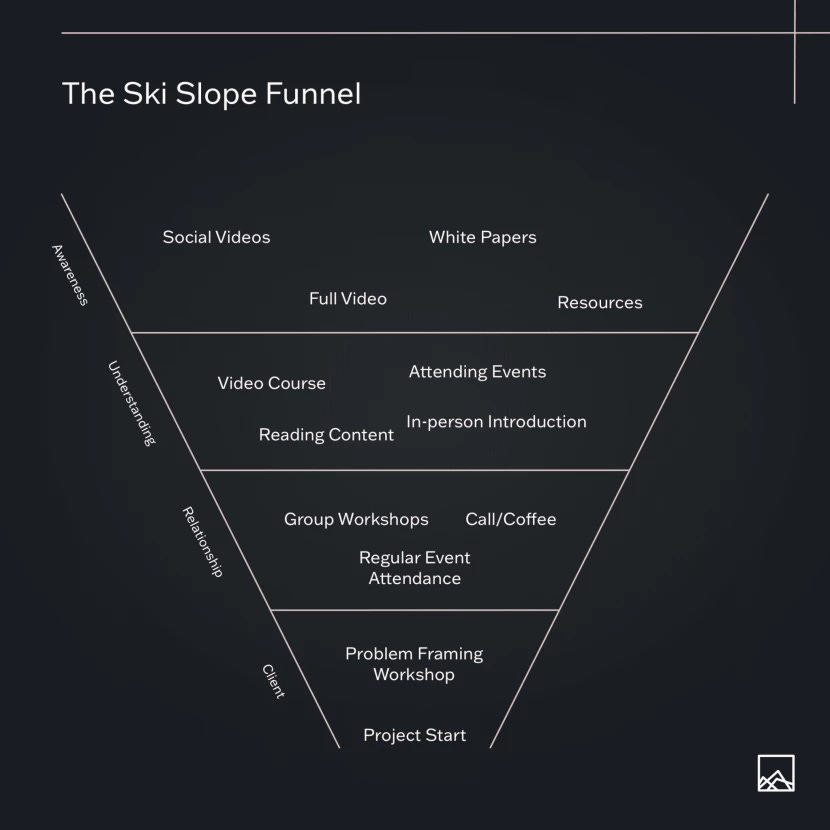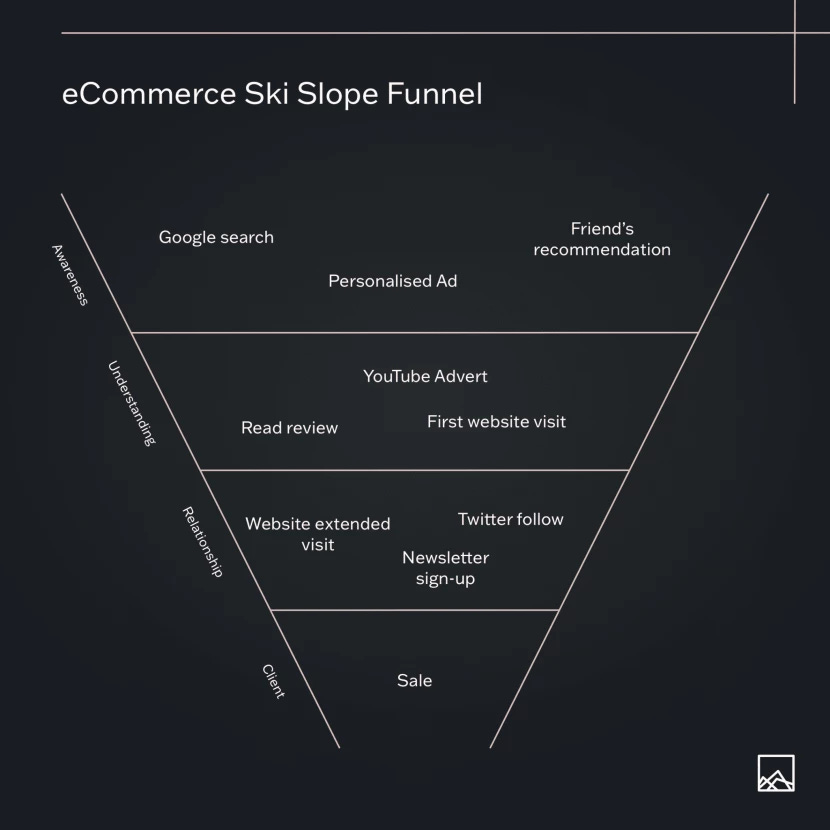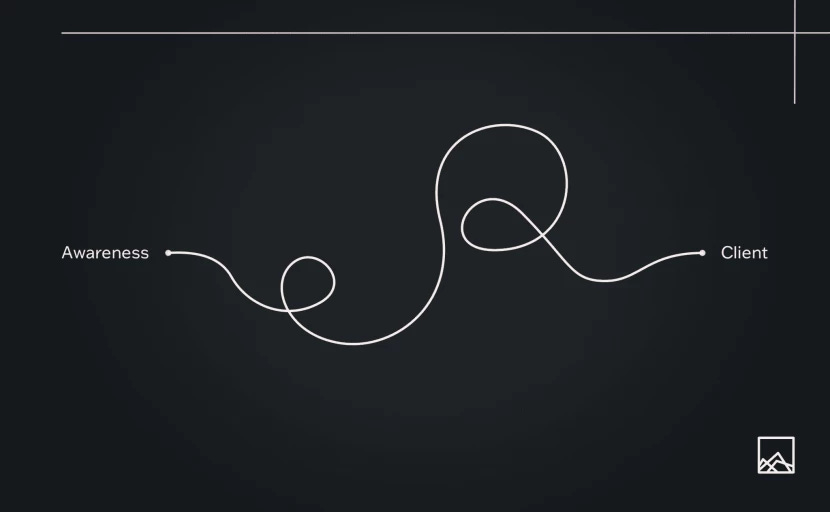The Ski Slope Funnel
We know that customers are individuals. Not all routes to sale will look the same. That’s when I began to visualise the different routes as a piste map.
Having taken to the slopes from an early age, coming down a mountain with two planks strapped to my feet is something that feels natural; the skis an extension of my own two feet.
Pete aged six
Some descents look different to others, easing in with a blue run to start the day, before ramping up to something more challenging like red, or black runs.
The outcome is always the same – reaching the bottom of the mountain.
Recently I was thinking about the complexities of marketing and sales; the numerous blog posts and books I have read, each with their own methodologies or mechanics for securing clients. Each with their own jargon, diagrams and action points (often overly-complex or niche to a sector).
How could we streamline the sales flow for our unique business?
We know that customers are individuals. Not all routes to sale will look the same. That’s when I began to visualise the different routes as a piste map.
Could we map these journeys, streamlining the routes to sales that are unique to our business?
If you have been in the business world for a while, you know that, at times, sales can feel far from streamlined. Some clients feel like a really warm lead, then tail off with no contact or explanation. Others jump straight to the sale and you are left amazed at how easily they sped to the bottom.
Acknowledging that people come in through different routes is key, but understanding what those repeat routes look like for your business (or in this analogy, ski resort) is where we start to hit gold.
In pursuit of a piste map for our sales at Steadfast, we started by looking at the standard marketing funnel.
Marketing funnel
It’s something you are likely to have seen before in one format or another.
A marketing funnel is a visual representation of how people go from the process of becoming aware of your business and into the next stages towards becoming a client.
There are four stages in our funnel; awareness, understanding, relationship and sale. The lower the potential client is in the funnel, the more likely the sale.
The funnel tiers
Awareness
Someone becomes aware of your business and where it sits in the sector. Perhaps they have heard about you in a conversation or seen your business on social media.
Understanding
It is clear what services or products you offer. The potential customer might have visited your website and read/watched some of your longer content. Not only do they understand what you do, they know why you do it. They might have taken a look at your portfolio or browsed your social channels.
Relationship
You have had a chance to meet or converse, virtually or in person. The customer is gaining a strong understanding of your business. They have likely heard your story and there is a mutual understanding.
Many people sit in this part of the funnel for months or years before moving towards a sale, and that’s okay. Even if this person never commits to a sale, they might know of someone who may need your services or may come back to you in the future.
For the individuals that you have identified in this stage, you should be looking to provide regular value. Send semi-regular emails, make introductions for them, send over content that would be interesting to this person. Remind them that you exist and are here when they need you.
Sale
At this stage, someone is ready to engage your products or services. They are looking for trust indicators to seal the deal – reviews from clients, examples of previous work, proof that you fully understand their business goals.
They want to feel confident that you can provide a solution to their problem.
Touch points
Now we have defined the four tiers of our funnel, we now need to fill our funnel with touch points. These are all of the different points of contact with a potential client. Try and list as many touch points as you can for each phase, even if some are more niche than others.
Steadfast Collective’s Funnel
eCommerce Example
Your funnel will be unique for your business, but it’s likely there is some commonality for your industry sector – so consider the routes to the sale that your competitors are utilising.
For example, an eCommerce business may look something like this:
Touch-points could be generic or hyper-specific depending on your business.
It may be that Jane Doe is a previous client who loves your product and who refers people to you on a weekly basis, if this is the case, she is a ‘super-connecter’ and she should feature in your funnel.
The Ski Slopes
I filled out our marketing funnel above for Steadfast but wasn’t content that it told the full story. How would someone seeing our content on LinkedIn finally end up partnering on a project?
Was there a way to map out the next step they were likely to take based on our experience with previous clients?
It was only once we joined the dots, that we saw the magic… and the ski slopes.
Perhaps it’s my longing for the Alps but these coloured lines traversing across the piste really helped me to visualise repeat scenarios taking us from an unknown to a business partner.
In the world of skiing, the difficulty of a slope is indicated by a colour. Starting with green as the easiest, blue, red and then progressing onto black ski slopes for advanced skiers.
Mapping out customer journeys on your marketing funnel can follow this simple key too, with green representing the easiest channels.
For example, a green route could look like this:
Personal Introduction -> Coffee Meeting -> Workshop -> Sale
On the other end of the scale, a black route represents a much more difficult path to sale:
See you sponsoring an event -> Social Video -> Full Video -> Meeting -> Workshop -> Sale
Going off-piste
Muscle memory is a wonderful thing for skiers, enabling descent to be repeated time and time again, even after several months away from the snow. But some days you might hit a bit of ice and take a tumble, or decide to leave the piste and go freestyle.
Clients are similar.
They won’t all follow your piste map. And that’s ok.
This exercise is to map the most frequently used routes to identify areas you can really bolster and focus your marketing efforts.
Know which routes work best and invest intentionally in the associated touch-point areas.
You might also be able to map unique journeys of particular clients who went somewhat off-piste, descending by non-traditional means.
Are there lessons to be learned from this? New areas or ideas you could chip into to carve this means of descent out for others to follow?










